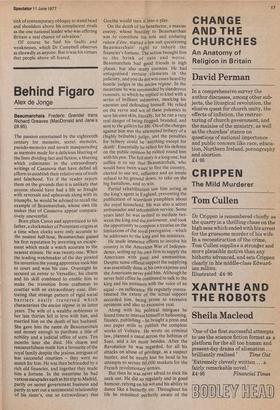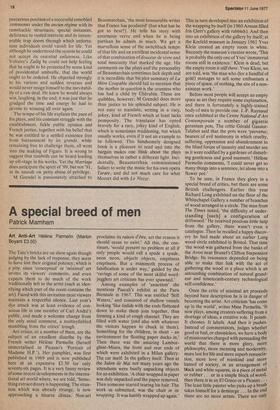Behind Figaro
Alex de Jonge
Beaumarchais Frederic Grendel trans Richard Greaves (MacDonald and Jane's £6.95) The passion entertained by the eighteenth century for memoirs, secret memoirs, pseudo-memoirs and novels masquerading as memoirs made for a delicious blurring of the lines dividing fact and fiction, a blurring which culminates in the extraordinary writings of Casanova that have defied all efforts to establish their relative mix of truth and falsehood. Yet if the reader rejects them on the grounds that it is unlikely that anyone should have had a life so fraught with reversals and upheavals along with its triumphs, he would be advised to recall the example of Beaumarchais, whose own life makes that of Casanova appear comparatively uneventful.
Born plain Caron and apprenticed to his father, a clockmaker of Protestant origins at a time when clocks were only accurate to the nearest half-hour, Beaumarchais gained his first reputation by inventing an escapement which made a watch accurate to the nearest minute. He was twenty-one. When the leading watchmaker of the day pirated his invention the young apprentice took him to court and won his case. Overnight he secured an entree to Versailles; his. charm and his skill combined to enable him to make the transition from craftsman to courtier with an extraordinary ease, illustrating that strange pattern of rigid social barriers easily traversed which characterises the ancien regime in its latter years. The wife of a wealthy nobleman in her late thirties fell in love with him, and married him on the death of her husband. She gave him the name de Beaumarchais and money enough to purchase a title of nobility and a judicial office of sorts. Ten months later she died. His charm and resourcefulness made him a favourite of the royal family despite the jealous intrigues of less successful courtiers — they were no match for him. He was then befriended by a rich old financier, and together they made him a fortune. In the meantime he had various escapades such as his trip to Madrid, partly on secret government business and partly to sort out a sentimental relationship of his sister's, one so extraordinary that
Goethe would turn it into a play.
On the death of his benefactor, a maniac enemy, whose hostility to Beaumarchais was to constitute his sole and enduring raison d'être, started a law suit questioning Beaumarchais' right to inherit the financier's fortune. The action brought him to the brink of ruin and worse. Beaumarchais had good friends in high places, but also many enemies. He had antagonised certain elements in the judiciary, and you do not win cases heard by hostile judges in the ancien regime. In the meantime he was surrounded by slanderous rumours, to which he replied in kind with a series of brilliant memoires, mocking his
enemies and defending himself. He relied on the verve and wit of these polemics to
save his own skin, literally, for he ran a very
real danger of being flogged, branded, and sent to the galleys for life. On of the charges
against him was the attempted bribery of a (highly bribable) judge, and the penalties for bribery could be 'anything except for death'. Essentially he relied for his defence on the public opinion he rallied round him with his pen. The full story is a long one, but suffice it to say that Beaumarchais, who would have been wiser to flee the country, elected to use wit, influence and an innate refusal to be ground down, to take on the big battalions, and to win.
Partial rehabilitation saw him acting as the king's agent in England, preventing the publication of scurrilous pamphlets about the royal household. He was also a secret ambassador and information service. Some years later he was invited to mediate between the king and the parlements, and took the opportunity to compose a treatise on the limitations of the royal prerogative — which he addresses to the king and his ministers.
He made immense efforts to involve his country in the American War of Indepen dence, setting up his own firm to supply the Americans with guns and ammunition. Despite some official support the supplying was essentially done at his own expense and the Americans never paid him. Although he never held office he continued to talk to the king and his ministers with the voice of an equal — on sufferance. He regularly overestimated the extent of the actual support accorded him, being prone to excessive optimism and also to excessive zeal.
Along with his political intrigues he found time to interest himself in ballooning, finance, publishing — he bought a press and two paper mills to publish the complete works of Voltaire. He wrote on criminal law, planned a canal across the Isthmus of Suez, and a lot more besides. After the Revolution he was regarded, for all his attacks on abuse of privilege, as a suspect hustler, and he nearly lost his head in his attempts to secure 60,000 muskets for the French revolutionary armies. But then he was never afraid to stick his neck out. He did so regularly and in good humour, relying on his wit and his ability to dance like a butterfly etc. Throughout his life he remained perfectly aware of the precarious position of a successful ennobled commoner under the ancien regime with its ramshackle structures; special instances, deference to vested interests and its innumerable trap doors through which unfortunate individuals could vanish for life. Yet although he understood the system he could not accept its essential unfairness. Like Voltaire's Zadig he could not help feeling that he ought to be protected by some kind of providential umbrella, that the world ought to be ordered. He objected strongly to his various and sudden reverses and would never resign himself to the inevitability of a raw deal. He knew he would always win, laughing, in the end; it was just that he grudged the time and energy he had to devote to winning all over again.
The tempo of his life explains the pace of his plays, and his constant struggle with the establishment, fickle public opinion and French justice, together with his belief that he was entitled to a settled existence free from harrassment by les grands, while remaining free to challenge them, all went into the making of Figaro. It is wrong to suggest that tumbrils can be heard loading up off-stage in his works. Yet the Marriage does anticipate the spirit of '89, but not '91, in its assault on petty abuse of privilege.
M Grendel is passionately attached to Beaumarchais, 'the most honourable writer that France has produced' (but what has he got to beat?). He tells his story with enormous verve and when he is being partisan he admits as much. We get a marvellous sense of the switchback tempo of that life and an excellent incidental sense of that combination of douceur de vivre and total insecurity that marked the age. His comments on the plays and the personality of Beaumarchais sometimes lack depth and it is incredible that his plot summary of La Mere Coupable should fail to mention that the mother in question is the countess who has had a child by Cherubin. These are quibbles, however; M Grendel does more than justice to his splendid subject. He is not easy to translate, writing in a racy, jokey, kind of French which at least lacks
• pomposity. The translator has opted bravely for a racy, jokey kind of English, which is sometimes maddening, but which usually works, even if it not an example to be followed., This handsomely designed book is a pleasure to read and into the bargain makes one think about the plays themselves in rather a different light. Incidentally, Beaumarchais commissioned Salieri to write the music for his own opera Tarare, and did not much care for what Mozart did with Le Nozze.



































 Previous page
Previous page